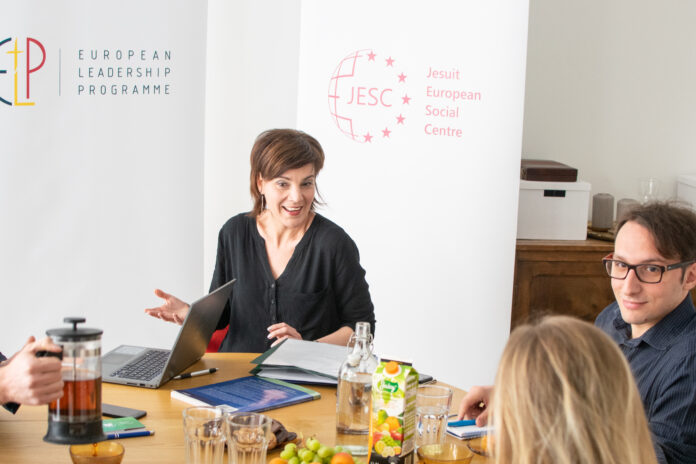On 14th of October the European Leadership Programme fellows engaged in a dynamic coaching session with Dr Szilvia Fodor.
Dr Fodor, who is a psychologist and professor at the University of Debrecen in Hungary, is a recurring trainer amongst the ELP fellows, having delivered coaching sessions and talks to all cohorts. With a broad background in research, developmental psychology, gifted education, organisational psychology, talent management, and creativity, her approach to leadership development represents a distinctive opportunity for the fellows to reflect upon career progress through a multifaceted methodology. During the first of the three sessions the fellows will attend, Dr Fodor explained the concept of workflow and the philosophy behind the creation of the simulation game FLIGBY.
What is flow and how it can be achieved?
By definition Flow is a state in which a person performing an activity is fully immersed in a feeling of energised focus, full involvement and enjoyment. The concept was introduced in 1990 by Prof. Mihaly Csikszentmihalyi in his book Flow, The Psychology of Optimal Experience. In 2003 Prof. Csikszentmihalyi published Good Business: Leadership, Flow, and the Making of Meaning, in which he differentiates between average and great performances in the working environment.
According to the theory, a person fulfilling tasks that are too comfortable for their level of skills can easily become bored with their routine which in turn will affect their performance. The same will happen to someone who is required to perform tasks that are too difficult for their level, only this time, instead of boredom the individual will experience feelings of frustration and anxiety. However, when the challenges are on par with the level of skills, flow will naturally occur.
According to Prof. Csikszentmihalyi:
‘When every aspiration is frustrated, a person still must seek a meaningful goal around which to organise the self. Then, even though that person is objectively a slave, subjectively he is free.’[1]
This implies that in achieving flow solely the internal factors are being considered. If the individual is increasing / decreasing the challenges which will determine the flow, one could argue that in the development of this theory the external factors have been disregarded.
Besides, if a synergy between the employer / company and employee is required as a precondition of achieving flow, it can be debated whether in certain working environments one can aim towards flow achievement or the idea of it is even fostered.
Assuming that the flow has been achieved, the individual is expected to experience a deep level of concentration, an enhanced sense of control and motivation, an altered sense of time, and a loss of ego. To stay in flow, one has to either increase the skills or decrease the challenges.
The connection between flow and leadership
Throughout the first coaching session, the ELP fellows also looked at the flow concept from a different angle, that of a resource within the working environment. Dr Fodor explained at length the correlation between flow and increased creativity, skills development and personal growth, engagement, and increased performance.
In order to contextualise the learning, all the participants will undergo a challenge by engaging in a game simulation, namely FLIGBY[2].
FLIGBY is an online, single-user, scenario-based Serious Game in an interactive movie format. It has the look and feel of a game, while it is simulating real-world events and processes.
The participants will have over a month and a half to complete the game. Upon completion it is expected that they will have achieved practical experience in change management processes, a more pro-active leadership approach, an increased consciousness in decision making, a more structured approach to handling situations, and effective conflict management techniques.
For those who aspire to become leaders there is no way to deny that they will do so in a future where uncertainty prevails. The use of simulation games aimed at enhancing those much-needed skills in development and leadership, are without any doubt, of great benefit. Additionally, with the increased use of Artificial Intelligence, predicting that future employees will see their training courses or development workshops designed and implemented by algorithms does not seem far-fetched.
There is also a great possibility that games such as FLIGBY could be readapted to a Virtual Reality (VR) mode which in turn will give their users a more enhanced real-life feeling, without having them sit through long and often tedious training sessions, since they could engage in the learning process from the comfort of their homes at their convenience.
For a long time now flight simulators have enabled pilots to experience all sorts of potential real-life scenarios thus, there is no reason why people training for positions in other fields should not benefit from similar training practises.
Adina Nutu
ELP Fellow
[1] Mihaly Csikszentmihalyi, Flow, The Psychology of Optimal Experience, Harper Perennial 1990, p. 92.
[2] FLIGBY is the official Flow-program for decision makers by Professor Mihaly Csikszentmihalyi and ALEAS Simulations. FLIGBY’s leadership development program combines video-game learning experience with sophisticated, benchmark-based competence assessment.
Visit the ELP website here




